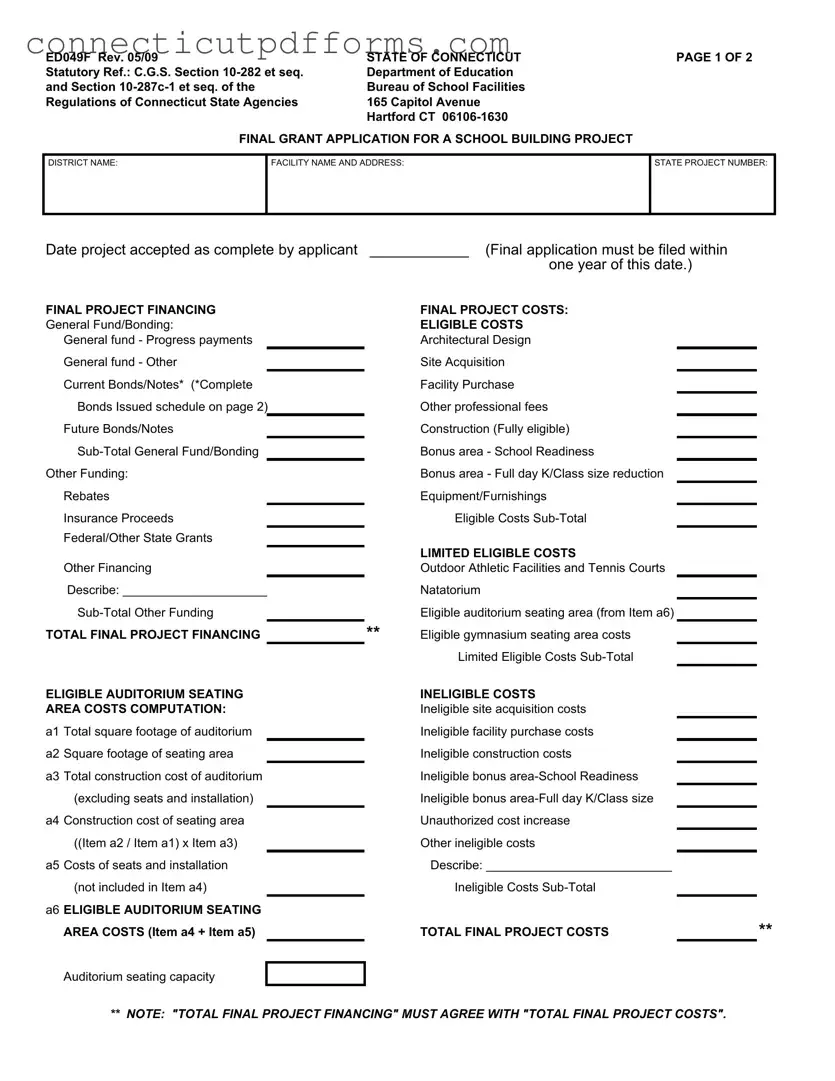The ED049F form serves as a final grant application for a school building project in Connecticut, and it shares similarities with the ED049B form, which is a preliminary grant application. Both documents aim to secure funding for educational facilities, but the ED049B focuses on initial project costs and planning, while the ED049F addresses final expenses and project completion. Each form requires detailed financial disclosures, ensuring that the state can assess the funding needs at different stages of the project.
Another document comparable to the ED049F is the ED049C form, which deals with the reimbursement of school construction costs. While the ED049F is concerned with the final application for grant funding, the ED049C focuses on the process of claiming reimbursement for already incurred expenses. Both forms require a breakdown of costs and certifications from school officials, reinforcing accountability and transparency in the use of public funds for educational infrastructure.
Additionally, understanding the purpose of a Bill of Sale form can further clarify transaction documentation. This form acts as a vital record that solidifies the agreement between parties involved, promoting transparency and responsibility in sales. For those looking for a comprehensive template, you can reference https://nyforms.com/bill-of-sale-template/ to create a reliable and legal foundation for your transactions.
The ED049D form also bears resemblance to the ED049F as it pertains to the final project report for school building projects. The ED049D captures the project's completion status and any outstanding issues, while the ED049F is primarily concerned with the financial aspects. Both documents emphasize the importance of reporting and documentation, ensuring that all stakeholders are informed about the project's outcomes and financial health.
In addition, the ED049E form, which is a change order application, shares some similarities with the ED049F. Change orders are often necessary during construction projects, and the ED049E allows for adjustments in funding based on unforeseen circumstances. While the ED049F finalizes the financial picture, the ED049E addresses modifications that may impact overall costs, highlighting the dynamic nature of school construction projects.
The ED049G form, which is an application for an extension of time for project completion, is another document that aligns with the ED049F. Delays in construction can occur for various reasons, and the ED049G provides a formal process for requesting additional time. The ED049F, on the other hand, is submitted once the project is completed. Both forms require the applicant to provide justification and documentation, ensuring that extensions are warranted and appropriately managed.
Lastly, the ED049H form, which is an application for a grant for school renovation projects, is similar in that it also seeks state funding for educational facilities. While the ED049F focuses on new construction and final costs, the ED049H targets renovations and improvements to existing structures. Both forms necessitate detailed financial reporting and compliance with state regulations, reinforcing the commitment to enhancing educational environments through state support.



